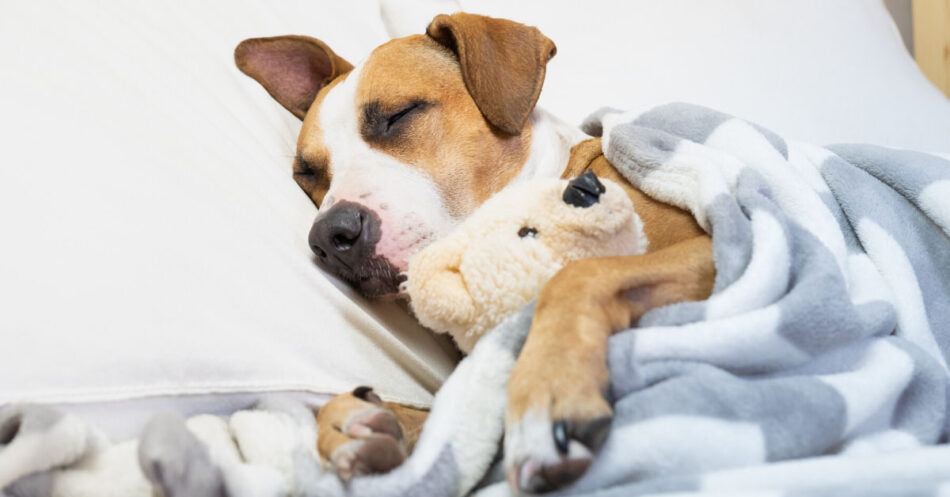
5 Helpful Tips on How to Calm a Restless Dog at Night
This post may include affiliate links. Please read my disclosure policy.
Many dogs come alive when the lights go down. They might get the “zoomies,” or they may simply pace or want to play. Aside from separation anxiety, nighttime anxiety can be one of your canine care hurdles. This isn’t great news for us pet parents who are ready to turn in for the night.
Why Your Dog Is Restless at Night
Below are some reasons why your pup may be having difficulty sleeping or settling down for the night.
- Lack of exercise or mental stimulation. A dog with pent-up energy is like a kettle ready to whistle! If they haven’t had enough exercise during the day, they’re ready to party all night.
- Anxiety or stress. Changes in the environment, a new family member, or even thunderstorms can make your dog restless. All forms of anxiety, whether it’s senior dog anxiety or separation anxiety, can affect your dog’s life in more ways than just their sleep, so consult your veterinarian on how to handle canine anxiety.
- Medical issues. Just like us, dogs can suffer from certain ailments and chronic pain that make getting comfortable a tricky task. An example is diabetes, as the need to urinate frequently can make it difficult for your pup to relax and sleep. Another possible disease that’ll make your pup restless at night is canine cognitive dysfunction, a disease that affects a senior dog’s brain.
- Diet. Restlessness can be caused by an upset stomach due to dietary indiscretion or eating something they shouldn’t, like garbage or table scraps. Food change can also cause digestive problems, which is why the transition should be done gradually over one to two weeks.
- Lack of routine. Dogs, like kids, thrive on routine. A chaotic schedule can throw their internal clock off balance and disrupt their sleep patterns.
Understanding what’s keeping your dog awake at night can be as easy as pie once you know what to look for. Howling or whining at night is quite common for anxious furry friends, especially for younger dogs. Our little pups may be adjusting to their new environment as they just recently separated from their moms. Other signs of restlessness may include pacing back and forth, whining or barking, and constantly changing sleeping positions.
How to Calm Down a Dog Before Bedtime
Helping your dog wind down for bedtime doesn’t have to be a tough task. With a few simple tricks, you can create an atmosphere that soothes your pup and sets the stage for a good night’s rest.
Step 1: Calm Them with Together Time
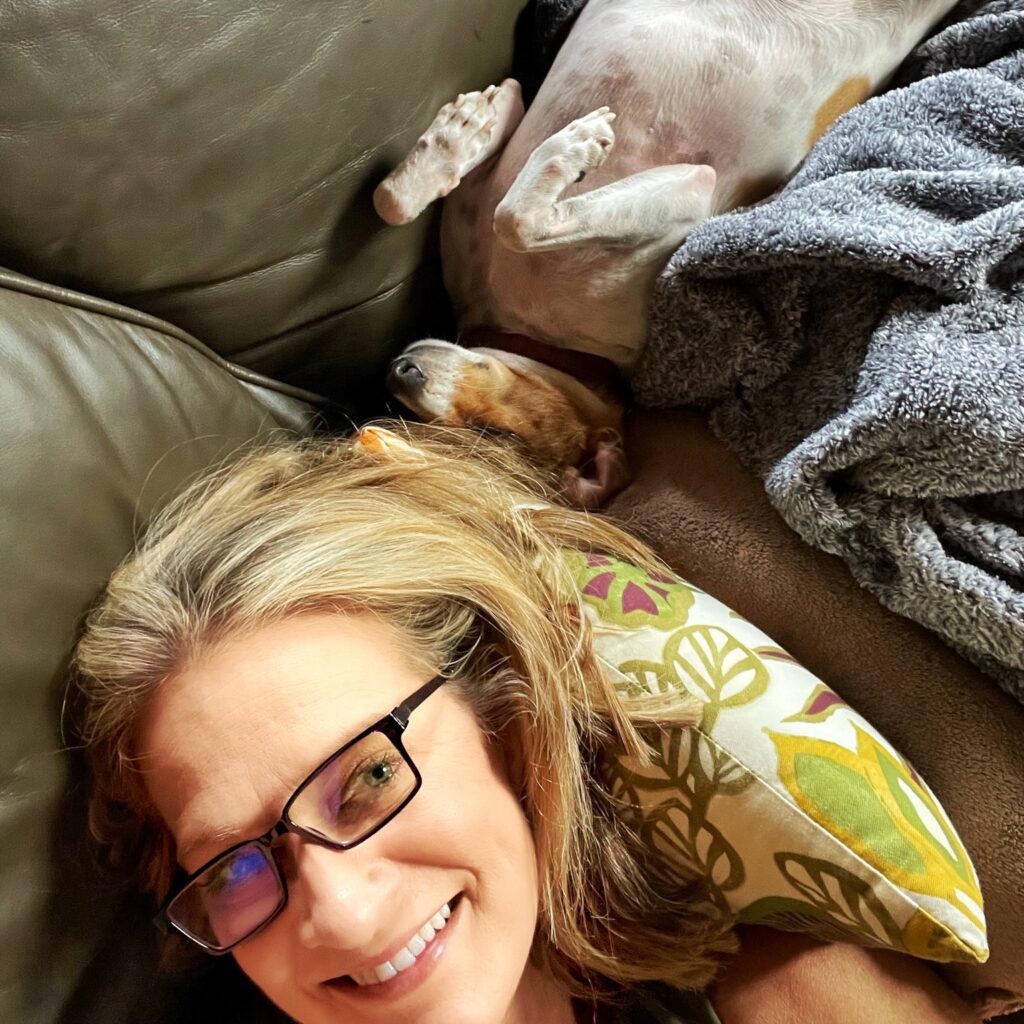
Dedicating time each evening to help your dog unwind will play a crucial role in their ability to relax before bedtime. It’s a great opportunity for both of you to unwind after a busy day.
Initially, you might engage in light play, such as a gentle chase around the house or a game of tug-of-war, but be sure to avoid vigorous activities as bedtime approaches since this can inadvertently boost their energy levels.
As your evening progresses, observe your dog’s cues indicating they’re beginning to tire—this could be pausing more often or taking a drink of water. At this point, transition to more serene activities that you both enjoy, such as snuggling, gently stroking their coat, or providing a soothing ear rub. These quiet moments of connection can significantly aid in relaxation, preparing them for sleep.
This shared time doesn’t need to be extensive; even 10–15 minutes may suffice for some dogs. The goal is to provide reassurance and comfort, letting your dog know you’re there for them. This is particularly important for dogs experiencing separation anxiety, as it helps them feel more secure.
Opt for gentle petting or quiet play that encourages relaxation, steering clear of any play that could rouse them instead of calming them down. Through these nurturing routines, you can set the stage for a peaceful night’s rest for your pup.
Step 2: Give a Calming Treat
Giving your dog a treat during your dog’s routine at bedtime will give him something special to look forward to every night. Associating bedtime with a yummy snack may also help you train your pup to settle down for bed.
Just like many dogs who seem to know somehow when it’s time for their people to get home or when it’s time for dinner, you may soon find that your own pooch is reminding you to give him his treat so he can go to sleep!
ElleVet’s organic Calm and Comfort chews support stress-free relaxation with their clinically tested blend of complete spectrum proprietary hemp oil! You can give this an hour before bedtime to help your pup keep calm.
What I love about these, and all of the products from ElleVet, including their hemp oil, is that they’re veterinarian-tested and recommended. With their dosage guide, I can confidently give my pets the right dose, knowing that it’s safe for their specific weight class.
Step 3: Provide a Secure, Comfy Place to Sleep
Does your dog sleep in the same place every night? Most likely, the answer is yes! Whether it’s their own dog bed, a favorite spot on the floor, or a place in bed with you, most pups sleep the best when they’re in their normal sleeping spot.
Make sure your dog has a comfortable, dedicated sleeping area. For dogs with joint pain or older dogs, orthopedic beds can offer extra support. Consistency in where they sleep can also help reinforce a routine.
My dog, Tulip, sleeps in bed with us, usually right between us, with her head poking out. But when she takes her naps, she loves her peach-colored round donut bed. It’s great for dogs who love to curl up, and I love it because I can throw the whole thing in the washing machine.
My dog, Chilly, who passed over the rainbow bridge in 2021, loved a bed with bolster sides. It gave him enough room to sprawl out a bit with the added security of something to snuggle up against for the night. This one is made with memory foam (great for a senior dog’s aching joints), and it has a machine-washable cover.
If your dog sleeps on the bed with you, consider giving them their own designated spot on the bed, using a blanket to carve out a little nest. They may wander from it during the night, but knowing they have their own area can help them feel secure enough to fall asleep at night.
If your dog won’t sleep at night, take a look at his bed. If he doesn’t use it or no longer uses it regularly, he likely needs a new bed better suited to his needs.
Step 4: Find His Favorite Cuddle Toy
Do you remember how safe and secure you felt as a child when you snuggled in bed with your favorite teddy bear? Well, dogs can also find security from a special soft toy.
Now, not just any old toy will make the paw-fect bedtime buddy. Don’t give him anything with squeakers—that will probably just wind him up and get him in the mood to play! Similarly, anything you usually use to play fetch or tug with may not be the best choice. Ideally, you want a toy that only comes out at bedtime or other “down” times.
This adorable duck makes the perfect bedtime buddy. It’s super soft, squeak-free, and it won’t encourage thoughts of rambunctious play.
Pin Me!
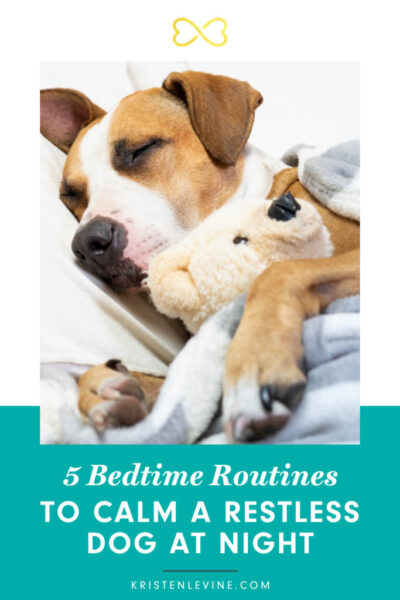
Step 5: Use Calming Scents and Sounds
Many pet parents ask, “What can I give my dog to sleep at night?” However, rather than immediately turning to medications, you might try some more natural therapies.
Some scents can have a calming effect on the human members of the family, and the same is true for our tail-wagging friends. Spraying your dog’s bed or bedtime toys with a calming blend of essential oils is a great way to alleviate any lingering anxiety from the day and get your pup ready to sleep through the night.
I love this all-natural essential oil spray from ThunderEssence, the makers of the ThunderShirt! It’s made with lavender, chamomile, and Egyptian geranium essential oils, and it smells amazing! I’m tempted to spray it on my own pillow, but for now, I’ll save it for Tulip’s bed and cuddle toys!
Your pup’s sensitive hearing may be able to pick up unfamiliar sounds or noises that you can’t. This can make them anxious or curious. Calming music, like classic music, can also help calm down a dog and get him ready for bed. I use the Zoundz app for my pets. It’s designed specifically to reduce a dog’s anxiety. I also love that every download contributes toward the Harmony Project, a program designed to alleviate anxiety in shelter pets.
FAQs
What If My Dog Is Restless at Night While I’m Crate-Training Him?
If your dog is restless while you’re crate training him at night, start by placing the crate in your bedroom so he doesn’t feel alone. Introduce the crate positively with treats and toys to make it inviting. Gradually increase the time the dog spends in the crate with the door closed during the day. When the dog is sleepy, encourage him to nap in the crate. Once he’s used to the crate during the day, he should be more comfortable at night. Check out this guide on how to crate-train anxious and senior dogs.
Should I Sleep with My Dog?
I mentioned that I sleep with Tulip, but deciding to sleep with your dog is a personal choice! Sleeping with your pup has quite a few potential benefits, such as emotional support and physical health improvements, including reduced anxiety (for both of you) and lower blood pressure. It also promotes bonding and can strengthen your immune system. However, sleeping with your pup may also disturb your sleep and make your allergies or other health issues worse.
You may want to wait until a dog is fully trained and to ensure they also have their own bed, which provides them with their own personal space. This approach can help manage any restlessness at night and maintain a good sleep environment for both you and your pet.
When to Get Help from the Professionals
Even with our best efforts, some dogs will always be more naturally prone to hyperactivity and anxiety. As pet parents, we sometimes wonder if we did something to cause our dog’s anxiety. Did we not give them enough love? Enough exposure to noises and people?
Dr. Lisa Radosta, DVM, assured me this is often not the case with most dogs who have not experienced trauma (like being surrendered to a shelter). Just like people, some dogs are simply coded to have more anxiety. It’s literally in their DNA!
You can learn more about that in this post about separation anxiety.
So, if you’ve tried the above tips and your dog is still experiencing signs, it may be time to call in your dog’s veterinarian or a behavior consultant.
I always recommend finding help through the American College of Veterinary Behaviorists. Here you can obtain contact info for a certified veterinarian who specializes in behavioral issues like anxiety. Who better to advise you on your dog’s health and behavior than a veterinarian?
With help, even the most anxious dog (and his mom or dad) can get a good night’s sleep!




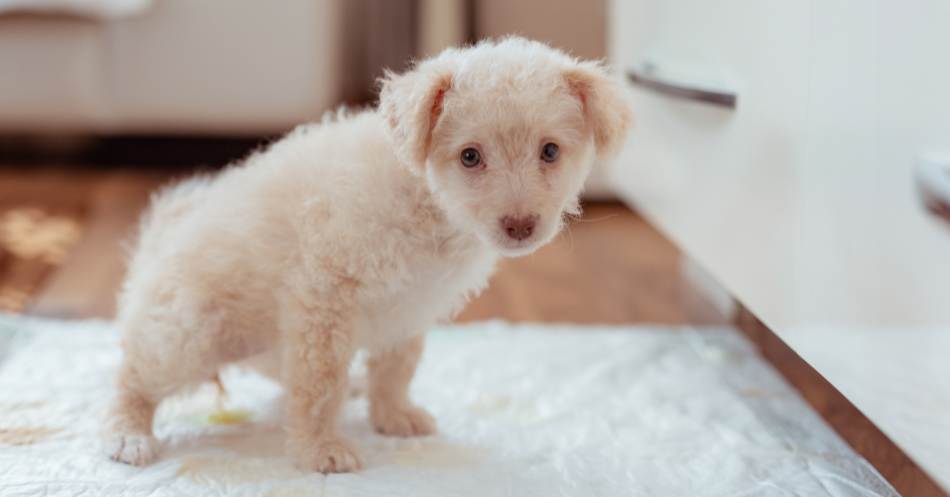

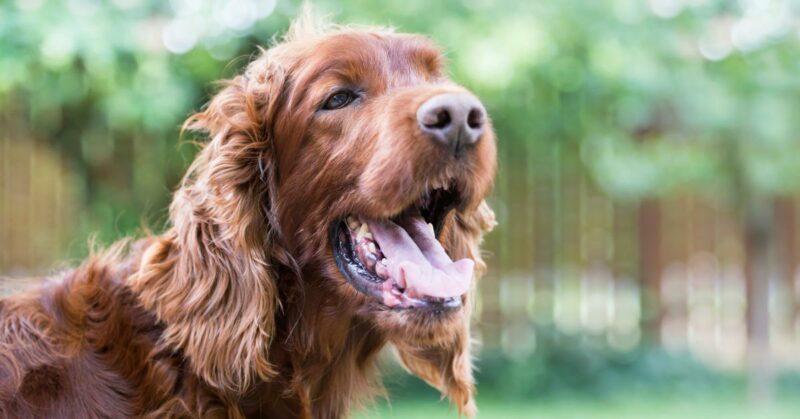

Between 6-8..13 yr old japaneese chin Male, seems to do everything to get our attention, we are watching the nightly news. 8 goes out on leach to walk , then bed in our bed. 5 min. Later wants water.
Then settles down, sleeps all nite.he is with us 24/7 unless dr app. Etc.
It sounds like he knows how to keep your attention! Good to hear that he sleeps all night!
my dog is 16 years old. My dog always scared at the stormy night. However, past two nights (after the previous stormy night) he woke up and came to my bedside and start soft bark to wake me, he was acting scared and heavy breathing. I get up and pet him and went to the bathroom, he attached to me and seems to be calmed a little, but when I went back to bed, I could hear his heavy breathing again.
How can I help him?
Hi Rachel,
It sounds like your dog has noise aversion. That means, fear of loud or sudden noises. This is very common in dogs and usually things like thunder, fireworks or other loud noises send them into a panic state.
I’ve written a lot of articles about this. Here’s a good one for you to read to get your pup some relief!
https://kristenlevine.com/dogs-anxiety-everyday-noises/
I hope this is helpful!
Kristen
Thanks for the tips! We have a new rescue pup (4-5 years old) and he’s a dream dog during the day. When it’s time to go to bed, it become a giant game to him jumping on and off the bed, trying to climb up in our faces, etc. He won’t stay in his bed and apparently is not used to going in a crate to sleep. Of course, he was a wreck all night July 4th with all the fireworks going off. Any thoughts?
Hi Deborah,
Poor pup (and poor you)! It sounds like he needs a new bedtime routine. A few recommendations:
– Try crating him at night and giving him a yummy treat when he goes in there. Something that will last a while, like a Kong stuffed with something he loves. Let him out to go potty before you put him inside, and make sure there’s comfy bedding and I would even add an Adaptil diffuser near the crate (this releases pheromones into the air that calm dogs). Let him out the next morning, early (in case he has to go potty). Establish that PM/AM routine and eventually, he’ll be putting himself to bed. Seriously!
-If he can’t adjust to the crate, try the same approach but tell him to go to his bed at the same time each nigh. Same thing, yummy treat and give him zero attention when he misbehaves.
I know, sounds easier than it is, but if you are persistent and don’t let him win, you will win. It might take some time and patience, but you can do it!
As for the fear of loud noises (fireworks, thunder), check out my other article about this.
Hope this helps! Thanks for adopting!
Kristen
Hello! Deborah’s story about her pups anxiety is exactly like ours! Adopted a 1y/o female Aussie mix less than two weeks ago. She has a tough time going to sleep without jumping on/off our bed, crawling under the bed, pacing and escaping our room to hide down stairs. Last couple nights we have been enticing her to sleep in her crate with treats, however she doesn’t always want to go in her crate. We’re committed to positive reinforcement, however this doesn’t seem to be enough to get her in the crate every time. Is it ok to Gently push her in? How do we draw the line between positive reinforcement and enforcing a routine?
Hi Matt! It sounds like your pup is having a hard time adjusting to a bedtime routine. There are ways you can establish a routine while using positive reinforcement. Here are a few recommendations:
-First, it is really important that she is actually tired at bedtime. Make sure you are giving her enough exercise (playtime and walks) throughout the day!
-If she does go into her crate on her own, give her a yummy snack she can have that will keep her occupied for a while, like a Kong filled with something she loves! Ensure she has gone to the potty before you put her in the crate and make sure the space is comfortable for her to sleep in – try a dog bed like this one! Try and put her to bed at the same time each night so she can develop a routine. Try not to give her attention if she misbehaves – I know it’s hard!
-If she can’t adjust to the crate, try the same approach but tell her to go to her bed at the same time each night. Give her a treat that she enjoys and don’t give her attention when she misbehaves.
If you are persistent and don’t let her win, you will win. Since you have only had her for two weeks, it will take some time to develop a routine that works. Positive reinforcement is great and you will see results! My puppy Tulip is 5 months old and it took her about 3-4 months before she started to put herself to bed at night! She walks right into her crate about 9pm and we close the door. Not a peep from her till morning!
Hope this helps! Thanks for adopting!
Kristen
I just adopted 1½ month old puppy, I love her alot but she keeps biting hands and feet, even if we give her toys she plays for 1-2 minutes and then again she prefers foot and hand, we tried alot of things like punishing her by keeping her in a tub alone for 2-3 minutes and also saying “No” in firm and loud voice, also we tried giving her treat if she licks instead of biting, but of no use. Is it because she wants to play or is she very small to understand this type of training? Please help!
Hi Prajay,
Oh no! That is a frustrating behavior. Puppies, especially when they are that young, think that biting is playing! So, she likely is not trying to hurt you, she is just trying to play. The best way to redirect the behavior is to use positive reinforcement. It will take a lot of patience, but it is not hopeless! So, when she bites, take a chew toy and place that in her mouth instead. That can help her to learn to chew on her toys and not on your hands. Since she is so young, she is likely teething, so getting her a good chew toy will also help calm her. I like these ones!
Let me know if this helps! Stay strong, she will stop biting soon!
Kristen
Hey my shihtzu is 3 months and he does not sleep at night instead he sleep at day time and he wants to play at night
Hi Ria,
Congrats on your puppy! Puppies are playful and need a lot of extra attention. Does he have a routine? If not, be sure to establish a routine for his day. That means he should be fed at the same time each day, have a set playtime in the afternoon/evening, a set walking schedule, and a set “bedtime”. Regular exercise for him through playtime and walks will help him to feel more tired at night. Interactive treat and puzzle toys, like this one, can help keep him busy during the day to keep him active! Also, when he is old enough, it is best to get him neutered as that will help calm him down. The Anxious Pet also makes a CBD oil for pets that can help them feel calmer and my puppy loves it.
I hope this helps! Stick with it! Puppies are fun but take a lot of attention. Your pup will thank you once you find a good routine for him 🙂
Wags,
Kristen
Hi.
My five year old Jack Russell has slept on my bed since day one with no problems. A few times this week he’s been a lot different. He settles down fine at first but after a while he begins to shake. I put him outside a few times but afterwards he sometimes to refuses to get back on the bed.
When he does get back on he gets very clingy and won’t go back to sleep. He eventually does, but only after a lot of reassurance.
It’s very worrying because he’s not normally nervous about anything.
Im a first timer pet owner. I have a 11 week Shichon who I’ve had for almost a week. I’m having a difficult time with his crying at bed time- I live in an apartment and he is a ESA so I can’t have him disturbing neighbors at night because they cane revoke my rights to have him. Do you have any additional support to offer help – right now I’m having to get him out and he thinks whining gets him what he wants – and it does. I don’t mind him sleeping in his carrier on my bed w me – I actually love it 🙂 – but I don’t want to do him a disservice.
Hi Lucia, congrats on your first pet! Bedtime routines can take time, especially with puppies! Here are some tips:
-If you want him to sleep in his crate, ensure he has had plenty of exercise that day (walks and playtime) and has gone to the potty prior to putting him inside. Give him a toy that will occupy him for a while, so he is less likely to whine. Additionally, if he has a favorite toy, put that inside of his crate too!
-If you find he is not adjusting to the crate, try getting him a large comfortable dog bed, like this one, and put him to sleep at the same time each night following the same steps as above.
Bedtime routines can take time. But, before you know it, you will have a routine that works for you both… and your neighbors 🙂 My new puppy Tulip is 5 months old and it took her about 3-4 months before she started to put herself to bed at night! She walks right into her crate about 9pm and we close the door. Not a peep from her till morning!
Hope this helps! Keep me updated.
Kristen
I have an 11 year old Shiba Inu who has recently started pacing, whining, and standing up and scratching at my wife and I all evening. He’s usually shaking and looking paranoid the entire time he’s doing it, but he won’t let us near him. We try to pet him or hold him and he runs away with his tail tucked. It usually starts from midnight and has lasted at time all the way up to 6 am.
I’m at a loss for what we should do, but none of us can get any sleep because of it. At first I thought there’s a owl or something in the house he can’t find so he’s freaking out, but we have a larger breed that is perfectly fine, and she doesn’t seem to notice anything.
He doesn’t seem to do any normal activities during these episodes. He doesn’t want his toys, or snacks. He just wanders around, tail tucked scratching at us, and whining.
Can you provide any advice?
Hi Christopher,
Sorry for my delay in reply!
This is such a difficult issue! Pet anxiety can be caused for any number of reasons. How long have you had him and have you recently moved? If he is newer to your family or you are in a new environment he may just be adjusting. Additionally, if there has been ANY change in his routine, that can cause anxiety. It’s best to be sure you have a set routine for feeding, walks, and playtime so he has something to get used to throughout the day. That will help him to feel more at ease.
I would recommend bringing up this behavior to a vet or a certified animal behaviorist. They are the experts in pet behavior and can help you nail down the cause! You can find one near you here: https://www.dacvb.org/
I hope this helps. Good luck and keep me posted!
Wags,
Kristen
I adopted a 4 year old Chihuahua 2 months ago. I set up her crate in the living room and she loved it right away and still likes to spend most of her lounging time in it during the day.
However, it has become increasingly difficult to crate her at night. As I mentioned, she loves laying in the crate during the day, even at night too, but she has learned the routine – as soon as we get back from her final walk of the day, she wants nothing to do with it. I can’t coax her in with food or toys. She stops listening to “come” and stop responding to her name – she seems paralyzed with anxiety as she realizes she’ll be in the crate separated from me for the next 8 hours or so.
It’s gotten to the point that I have to pick her up and place her into the crate, pet her, tell her to stay, and once she’s relaxed, I close the door – no whining, no scratching. She will sulk or hide under furniture to avoid the crate. I don’t trust leaving her free to roam with my bedroom door closed as I’m a light sleeper and she will sometimes scratch on doors when left alone or in a different room.
As a note, I do not crate her when I leave her alone – I did at first, but realized she did not have destructive tendencies and seemed to get anxious when she knew we would be separated, so I thought keeping crating just to night would be better and avoid separation anxiety…
I know putting her into the crate can give her a negative association with the crate at night, but I don’t know what else to do. Trying to go to sleep at night has become exhausting because it has become stressful to get her to bed. Should I be crating her more during the day? Should I just place her in the crate right away when I’m ready to sleep instead of waiting for her to get in on her own? Should I get rid of the crate and get a bed/baby gate for the kitchen? Should I get a ringed fence for her crate for night?
Appreciate any advice you can share!!!
Hi
My 6 month used to take herself to bed at 8pm everyday, we’d shut the crate door and not hear from her until 6 in the morning.
Recently she takes to whining as soon as we leave the room when she’s in her crate, so we wait til.shes asleep then leave. She has starting waking once or twice in the night and barking relentlessly until someone comes to the room be with her. She then will only go to sleep if someone is there.
What can we do to get her out of this?
Hi Luke,
Has she recently had a change in her routine or has there been any environmental changes? This could be causing her some anxiety meaning she is scared when you leave her at night.
Additionally, it is important that she has a set playtime and walk time/potty time right before she goes to bed. That will help her to feel tired when it is bedtime and actually go to sleep and stay asleep.
I would recommend trying some of The Anxious Pet’s CBD oil or chews at night to help naturally calm her as well! They have helped my dogs feel a little calmer. You can try them here.
I hope this helps! Keep me posted!
Wags,
Kristen
Hi Hailey,
I’m sorry for the delay in responding to this. I’m so sorry you’re struggling with the nighttime routine.
You say she likes her crate during the day, but at night it’s hard to get her in there — kind of like a child who doesn’t want to go to bed, LOL.
I think you have some options. If the crate at night is stressing her out, try another form of containment like a baby gate. Or, if you aren’t worried about her being destructive or getting into trouble, you might try leaving her out at night. Chances are she’ll find a favorite place to sleep until morning.
One thing you should be sure to do regardless of what option you choose, is to make sure she’s getting enough exercise and mental stimulation. If not, she can become anxious just because she’s not getting enough physical or mental activity during the day. A tired dog is less likely to get stressed.
I hope this is helpful! Let me know!
Kristen
I have a 10 month old Neo Mastiff who was given away by his previous owner at about 6 months and then given to me at almost 10 months. He’s a good dog most of the time, he knows basic commands and we crate him during the day while at work and he is fine (I let him out at lunch) but we have had him 6 weeks and never crated him at night, mainly because I felt bad cause he was crated all day but he doesn’t sleep much, 3 hours maybe and then he’s up again and just as hyper, always getting into stuff, jumping on us in bed, tearing up stuff he shouldn’t be, the only way he will sleep in his crate at night is if I am in the living.room on the couch so he can see me. He’ll cry a little and then go to sleep but he’s up again in a few hours and cries more and tries to get out and I just feel like he needs some CBD or something to get sleep. I have no idea what his sleeping routine was before but he definitely needs some behavior training
Hi Kimberly,
It takes time to get puppies used to a bedtime routine. My puppy Tulip is 5 months old and it took her about 3-4 months before she started to put herself to bed at night!
One thing that is very important is ensuring that your dog is actually tired at bedtime. Make sure he has had playtime and walks before going to bed. That way, he is more likely to actually sleep. Since he is crated throughout the day, try keeping him occupied with a puzzle game or toy he can have in his crate with him. Like a Kong you can fill with something yummy. Then, make sure to have playtime and a walk when you get home to tire him out.
I hope this helps! Thank you for your question.
Kristen
I have a 14yr old papillon that has become more anxious than usual. She walks back and forth all day panting or coughing. She does the same at night. I hear her jump on and off my bed throughout the night. She’s very attached to me and I believe she has separation anxiety. If I leave her sight for 5mins and come back she starts screaming as if she has not seen me all day. She will not eat if I am not present. Although she’s so attached to me she’s also skittish. She’s become more and more skittish throughout the years. Sometimes she’ll scream if I try to pick her up. Nothing is physically wrong with her so I don’t understand. I have two other dogs and when I give them attention my papillon starts coughing and panting. Her vet informed me on her last visit a couple months ago that her vision can best be described as someone looking out of a dirty windshield. Other than that she was healthy. I am worried to say the least. What can I do for her?
Hi Jessica,
Gosh that is so tough! It breaks my heart to watch my pets go through any anxiety.
It sounds like it’s possible her vision issue could be the cause of some anxiety. If she can’t see you, she might feel more anxious which could explain the unexpected barking/coughing/panting.
I would recommend making sure she has a set routine for her day so she knows what to expect between feeding time, play time, and walks. This can help her feel more calm throughout the day.
If you think anxiety is an issue, you should mention that to your vet as they may have some solutions for her. Hemp oil from The Anxious Pet is a drug free option that you could give her before you leave her to help her feel more calm. You can buy it here.
I hope this helps! Keep me posted.
Wags,
Kristen
I have a mini pincher/jack Russell 15 months old have always sleep in bed with us . We got in a play mate jack Russell 3 yrs old that wants to sleep in the be also. But now the 15 month old will not get in the bed.? They play together fell well alll day together. This is the only problem
Hi Gaylon,
The change in your mini pincher mix’s bedtime behavior could be due to his routine changing. When you added the 3 year old, the younger pup experienced a change in his bedtime routine since the new dog is now also sleeping in “his bed”. It could just take him some time to adjust to the new sleeping arrangements!
If he is acting anxious at bedtime, you should try some of The Anxious Pet’s calming soft chews right before bed to get him to calm down and go to sleep!
My dogs love both bacon and peanut butter flavors!
Hope this helps!
Kristen
Our 10-year old dog Jellybean has suddenly been acting weird at night. 3 of the past 5 nights. She sits on the bed and just stares at us while we are “sleeping”. She pants and constantly walking over, and on top of us. This goes on for hours and hours. If I take her out, she’ll go to the bathroom, come in, and the behavior continues. Her activity level during the day has not changed. The only possible change is that she has not been able to go swimming due to blue algae in the lake here. Thanks for any help. 🐶
Hi Ann,
Has she had a recent change in environment/routine? The sudden behavior could be due to anxiety she is experiencing. Additionally, is she getting enough exercise throughout the day? If she is no longer swimming, you may need to replace that activity with an extra walk. When dogs have been active throughout the day, they are more likely to sleep soundly. I would still encourage you to bring up this new behavior to the vet as she could be trying to tell you something is wrong!
Hope this helps.
Kristen
We crate trained our min pin she will sleep with us or our daughter but will pee or poop at night. She has very high anxiety we started putting her in the crate. No matter what we do she will scratch the floor out side the cage. We give her composure for anxiety but still sctatches.
Hi Nic,
I am sorry to hear about your Min Pin’s anxiety! Have you ever mentioned this behavior to your vet? I would highly recommend that.
She is likely scratching due to anxiety and if you recently began crating her at night, she will need some time to adjust to that change in her routine. I would recommend ensuring that she has a clear routine throughout the day where you feed her, walk her, and play with her at the same time so she can can feel more calm and tired when it is time for bed. This could help her sleep better!
To help with the peeing and pooping, be sure to take her out right before bedtime so she can relieve herself!
I hope this helps! Keep me posted.
Kristen